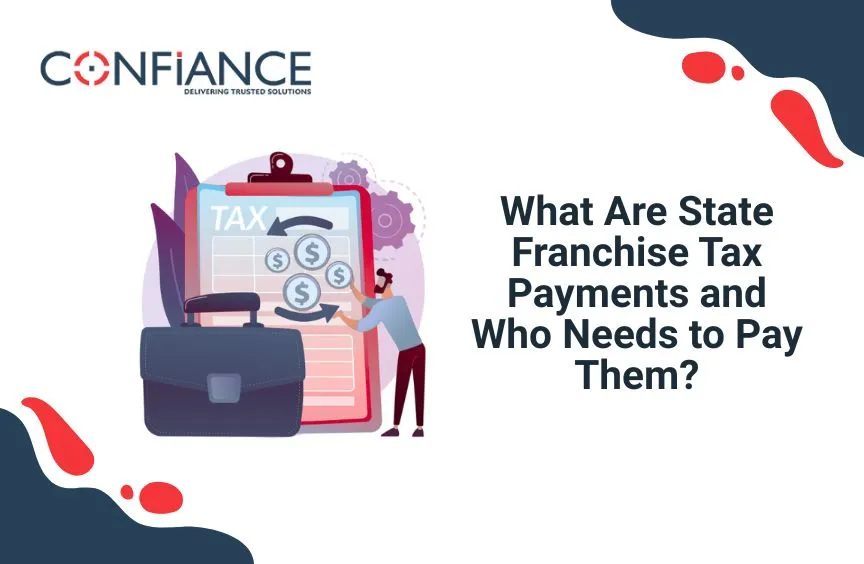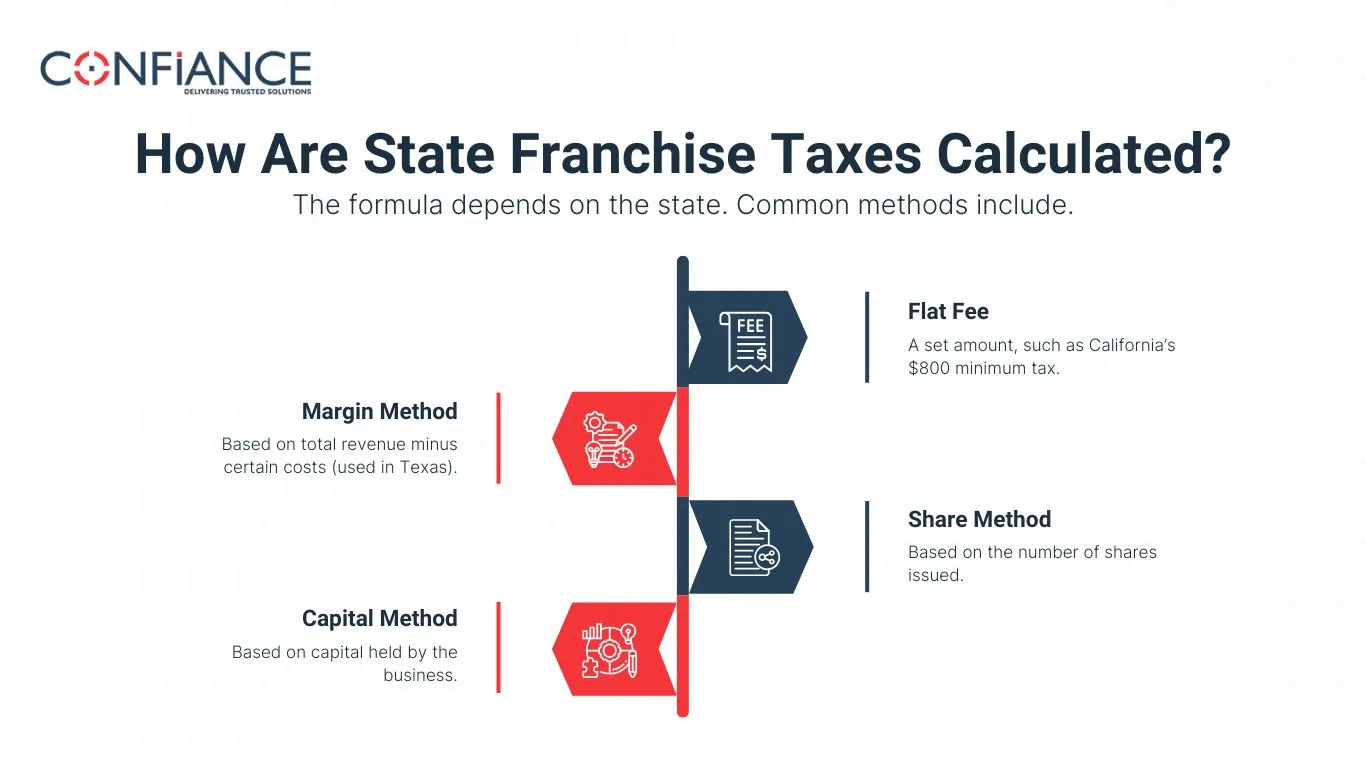
What Are State Franchise Tax Payments and Who Needs to Pay Them
State franchise tax payments are charges imposed by some states on businesses for the right to operate within their borders. These payments are not based on profit. Instead, they are often based on a company’s net worth, capital stock, or another fixed measure. The name “franchise tax” can be misleading. It doesn’t relate to a business franchise like a fast-food chain. Instead, it means a tax for having the privilege to do business in that state.
What Is a State Franchise Tax?
A state franchise tax is a recurring fee. It allows a business to keep its legal status in that state. It is separate from income tax. A business might pay both in the same year. The rules for state franchise tax payments vary by state. Some states use flat fees. Others calculate the tax based on capital, assets, or a company’s net worth.
This tax helps fund public services such as schools, roads, and government programs. States like Delaware, Texas, and California use franchise taxes widely. Each state has its own forms, deadlines, and rules. Businesses must follow those carefully.
Who Needs to Pay State Franchise Tax Payments?
Not all businesses pay franchise tax. Sole proprietors are usually exempt. Most corporations, LLCs, and partnerships may be required to pay. States determine who must file and pay based on the type and size of the business. Some nonprofits and small businesses may qualify for exemptions or lower rates.
If your business is registered in a state that charges a franchise tax, you likely need to pay it. Even if you don’t do much business there, just having legal status in that state can trigger the tax. Some states also charge out-of-state businesses operating locally.
Which States Require State Franchise Tax Payments?
Not every state has this tax. But the following states charge some type of state franchise tax:
- Delaware: Based on the number of shares or assumed par value.
- California: Flat minimum tax for most corporations and LLCs.
- Texas: Uses a margin-based system.
- Illinois, Georgia, Louisiana, Mississippi, Alabama, and others: Varying methods.
Each of these states has different filing rules. Some require estimated payments. Others charge penalties for late payment. Always check with the state’s official site or consult a tax expert.
How to Make State Franchise Tax Board Payments
Making a state franchise tax board payment is usually simple. Most states have online portals. You can file your return and make payments electronically. For example, California businesses can use the Franchise Tax Board (FTB) site to file and pay online.
Steps include:
- Register with the state if you haven’t already.
- Collect necessary data (gross receipts, capital value, etc.).
- Complete the required forms.
- Submit them by the due date.
- Pay using bank transfer, credit card, or mail a check.
Many states provide reminders and online tools to track due dates. It’s best to avoid late filings or missed payments to prevent penalties.
When Are State Franchise Tax Payments Due?
Due dates depend on the state. Here are examples:
- California: First payment due by 15th day of 4th month after fiscal year begins.
- Delaware: March 1 for corporations using the Authorized Shares method.
- Texas: May 15 for most businesses.
Some states offer extensions. However, you still must pay the estimated amount on time. Missing a deadline can lead to interest and fines.
Why State Franchise Tax Payments Matter
State franchise tax payments keep a business in good standing. Without payment, your business can lose its legal right to operate. It may also lose limited liability protection. That can open up owners to personal risk.
Regular payments also keep public records up to date. States use tax data to track active businesses. If you skip the payment, you might face penalties, extra fees, or even dissolution.
How Are State Franchise Taxes Calculated?
The formula depends on the state. Common methods include:

- Flat Fee: A set amount, such as California’s $800 minimum tax.
- Share Method: Based on the number of shares issued.
- Capital Method: Based on capital held by the business.
- Margin Method: Based on total revenue minus certain costs (used in Texas).
Businesses need to understand which method applies to them. Use tools or calculators offered by the state when available.
What Happens If You Don’t Pay the State Franchise Tax?
Not paying on time has serious effects. Most states charge penalties, interest, and late fees. Some revoke the right to do business. In California, failure to pay means suspension by the Franchise Tax Board. That stops the business from using courts, signing contracts, or protecting its name.
Businesses with revoked status must pay all back taxes plus fees to return to good standing. Reinstatement can take time and may delay key business actions.
State Franchise Tax vs. Income Tax
It’s important to know the difference. Franchise tax is for the right to exist as a business. Income tax is based on profit. A company may owe franchise tax even with no revenue. Not all states have income tax, but many that don’t still charge franchise tax.
For example, Texas has no personal income tax but does have a franchise tax. Delaware is known for its low income tax but charges franchise tax on most companies registered there.
Are There Exceptions or Exemptions?
Some states give breaks to new or small businesses. California waives its $800 minimum tax for the first year. Delaware offers lower rates for small stock corporations. Nonprofits, charities, and some cooperatives may be fully exempt.
Each exemption has rules. You must apply correctly and keep documents. Failure to meet exemption rules can lead to back taxes and fines.
How to Stay Compliant with State Franchise Tax Payments
To stay on track:
- Know your state’s rules.
- Mark key filing dates.
- File and pay on time.
- Keep records of payments.
- Use the state’s online portal.
- Get help from a tax professional if needed.
Many states offer electronic filing and payment reminders. Some let you sign up for notices by email or text.
How to Use the State Franchise Tax Board Payment Portal
In California, use the FTB website:
- Go to ftb.ca.gov.
- Create a MyFTB account.
- Find the correct form (such as Form 100 or 3522).
- Enter your business details.
- Submit the form.
- Make payment using your bank or card.
Other states have similar systems. Texas uses the Comptroller’s site. Delaware uses the Division of Corporations portal. Always use the official site. Be careful with third-party services.
Avoid Common Errors in State Franchise Tax Filings
- Missing the due date.
- Filing the wrong form.
- Using old business info.
- Skipping estimated payments.
- Not checking exemptions.
- Forgetting to update address or contacts.
To avoid these, use checklists and state guides. Many errors happen because of simple oversights.
Can You Outsource Franchise Tax Filing?
Yes, many businesses use CPAs or tax firms to manage filings. They help with:
- Form preparation
- Record checks
- Payment tracking
- Filing in multiple states
Outsourcing reduces risk of error. It also saves time, especially for multi-state businesses.
State franchise tax payments are a core duty for many businesses. They help keep your business active and compliant. Knowing when and how to make a state franchise tax board payment keeps your records clear and avoids penalties. Check your state’s rules, file on time, and keep proof of payment.
If your business operates in a franchise tax state, take it seriously. Make it a regular part of your yearly tax work. Need help with your franchise business tax? Confiance helps franchise businesses around the US with bookkeeping and tax. Our franchise bookkeeping service is one of our core expertise. Contact us now to get started with your state franchise tax.
FAQs
1. What is the purpose of a state franchise tax?
It allows a state to charge businesses for the right to exist or operate within that state, even if they make no income.
2. Does a sole proprietorship pay state franchise tax?
No, sole proprietors usually don’t pay state franchise tax because they are not separate legal entities.
3. How is state franchise tax different from corporate income tax?
Franchise tax is based on a business’s net worth or capital, not on its income or profits.
4. Can you owe state franchise tax with zero income?
Yes, some states charge it based on entity type or capital, even if there is no income.
5. Are LLCs required to pay state franchise taxes in all states?
No, not all states charge LLCs a franchise tax. It depends on state law.
6. What happens if I miss a state franchise tax payment?
You may face penalties, interest, or loss of good standing with the state.
7. Can I pay state franchise tax online?
Yes, most states offer online payment options through their state franchise tax board.
8. Do nonprofits pay state franchise tax?
Some states exempt qualified nonprofits, but others may still require a minimum tax or annual filing.
